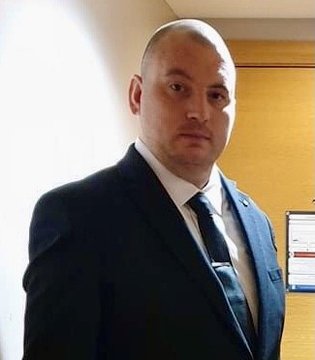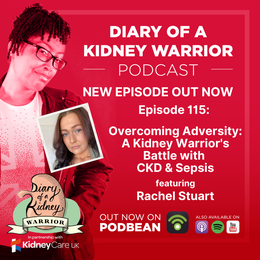Kidney disease, gout, and transplantation
"In secondary school, I started having flare ups of gout which carried on into college. I was working as a kitchen porter at 16 and I could barely stand at times, so I saw a doctor. It turned out my kidney function was around 40% and that was why I was getting gout.
"I was referred to renal specialist, who did some tests and found I had protein leakage. They sent me for a kidney biopsy, and I was diagnosed with Focal segmental glomerulosclerosis (FSGS). I still didn’t know what was really wrong with me. No one in family had had kidney disease, it felt just random.
"I went onto steroids to try to stop the protein leakage and I got really big, really quickly – I was about 68kg and blew up to 95kg. The steroids didn't work, and my kidney function started freefalling. I ended up needing peritoneal dialysis (PD) when I was 26. I was still working full time so I would take my PD equipment with me. I’d dialyse in a bathroom, do my session and then get back to work.
"Having kidney disease makes you more tired and my mind would say carry on, but the body said no! If I was poorly, it was for a longer period of time than most people. I've missed New Year’s Eves because of gout and kidney disease, and there were times I couldn’t go out with friends. When I was on steroids, they made me snappy and emotional. It was tough, especially at that age.
"I started looking for transplant options, and my dad was a match. I didn't know what to expect and I just wanted to get on with my life. It was a whirl of emotions. There were lots of sessions with Dad, psychological stuff as well as physical, and we went ahead to transplant in January 2015. From then, things changed massively."
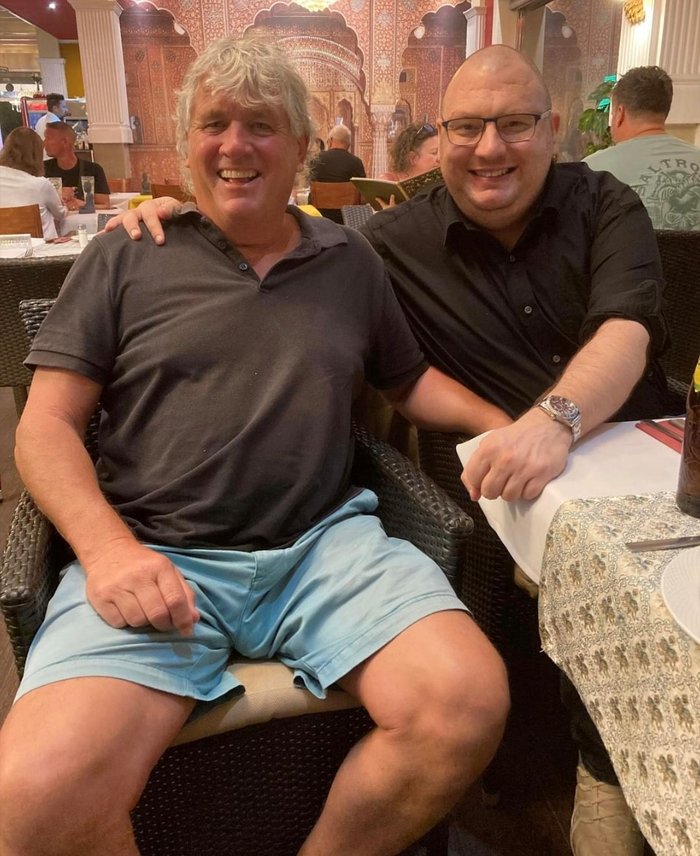
Living with sepsis and kidney disease
"The first time I had sepsis was after the transplant. My kidney wasn't working and a few hours after the operation I developed sepsis. I went onto emergency haemodialysis, then had a blood transfusion and ended up in intensive care for two or three days on antibiotics. I felt guilty, to think my dad had gone through all that and the kidney wasn't working. I was in hospital 29 days with no telly, no radio, just a single room.
"About 9 months later I saw a surgeon and my kidney function had improved a bit, so I lasted at around 10% function without needing dialysis, thankfully, until I had a second transplant from the transplant list in May 2023. I had a few issues after that transplant too – I developed diabetes (specifically NODAT, New Onset of Diabetes After Transplant) from medication and had to see diabetes specialists – but now I am at about 37% kidney function.
"Since the first bout of sepsis, I have had sepsis six more times. It starts when I feel poorly from an infection. What people need to realise is it that sepsis is rapid, the problems come on so quick. You start to feel ill, you might have an infection or bug of some sort, and you think it is going to go away or you can fight it yourself. One minute you feel okay, and half an hour later you have a temperature at about 40 degrees. Sepsis is a strange experience. It takes its toll on your mind and your mental health. So many times, I’ve asked myself, 'Why me, why now? Why not when I’m older, later in life?' I don’t know why these things happen. I live on my own, so when I felt unwell, I'd end up ringing my dad and stepmom. There were times my stepmom had to ring an ambulance because I was basically unconscious on the other end of the phone.
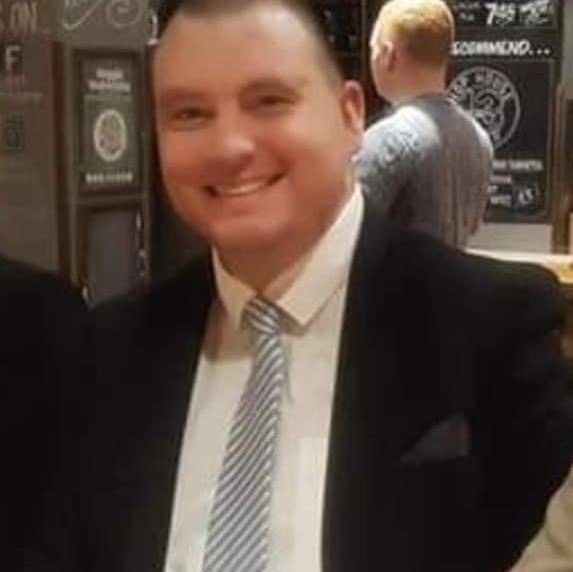
"One of the recent bouts was after my second kidney transplant. I went abroad to see dad and stepmom in Lanzarote for my dad’s birthday. I had more energy, and it was really nice to see Dad, but when I was out there, I got a urinary tract infection (UTI). I woke up during the night and couldn’t pee properly. I knew it was a UTI, but maybe because it was after the transplant, I thought I could just get over it.
"The next day I went to the local doctors and told them I needed to see someone urgently as I was at risk of developing sepsis. They didn't really understand, and I ended up being given antibiotics. I took them, went back to Dad's, and had a sleep. I woke up feeling worse, drank tons of water, but I still couldn't pee properly. I think by then it was too late.
"Dad came into the bedroom, and I said I was fine, and then about 10 mins later, I shouted for an ambulance. My stepmom called, trying to translate from English to Spanish that I had had sepsis before. My temperature was 40 degrees, I was throwing up, near enough unconscious. It was barely 10 mins before that I had told Dad I thought I'd be alright.
"I was taken back to hospital, and they did bloods and put towels on my head and under my armpits to cool me down. Apparently, I was randomly singing on the way to there, not making any sense, saying I was going to die. I don't remember anything after that.
"They treated me with a super strong antibiotic, and I was hospitalised for a week. It meant I couldn’t fly home when I was due to, so I stayed for another week. Back in the UK, I was still recovering from sepsis when I got Covid-19. It is interesting how, when you recover from something, people think you are okay. After I got back from hospital in Lanzarote, Dad was saying I’d be ready to go back to work the next week. He didn’t really understand just how something like sepsis affects you, and it’s harder to recover when you have kidney disease. Each time I've had it, it has taken longer for me to recover. People say, ‘you look great', but you're not well."
The mental toll of sepsis and kidney disease
"It's difficult to talk about living with sepsis and kidney disease. A good analogy is standing on the beach in shallow water and walking out to sea. A wave hits you, knocks you down and as soon as you get back up, bang, you’re hit by another wave. And another, and another. You're not quite drowning, but you have no time to recover before you are hit again and again. The toll it takes is mental, not just physical. I wake up with night terrors, sweating, sleep paralysis, vivid dreams of being in hospital – it is terrifying. I try to cope with it as best I can, but I do break down occasionally.
"It can be really difficult, but I still feel lucky to be alive. I’ve had 14 near-death experiences and there are lots of people who’ve had sepsis and who haven't survived, or who have had body parts amputated.
"Sepsis and kidney disease play havoc with your whole life. It's not knowing what the future holds when you’re trying to balance work life, social life, wanting to do things but not being able to. Everyone else is getting on with their lives, and you feel like yours hasn't even started. After a period of time, you just don’t get invited. I want to get married and have kids, but with sepsis and kidney disease it is really tough. I've had counselling sessions to help me try and get over things, and I would recommend that."
Know the signs: could it be sepsis?
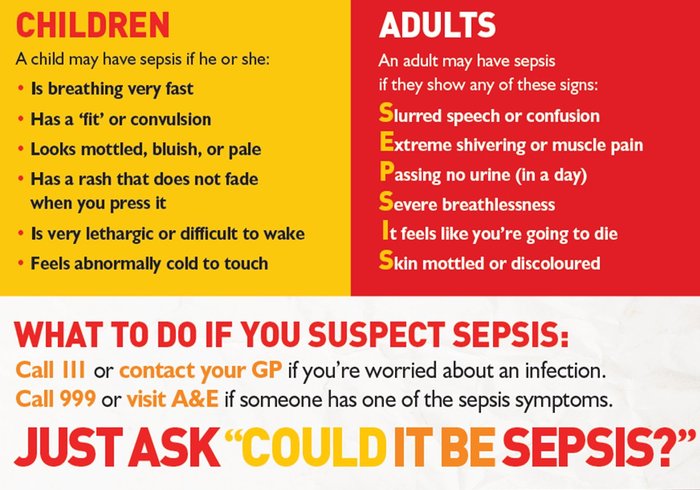
"If you're living with CKD, make sure you know the signs of sepsis. You’re more susceptible to sepsis and you’re more likely to get hit harder and for longer. Call a doctor or 111 if you feel unwell or have signs of sepsis, don’t wait for it to get worse. Ask for an appointment and just be honest. The more information you can give to a doctor or to 111 if you are ill, the better.
"What has helped me is buying things to allow me to check for symptoms of sepsis myself. I got an oximeter to measure the oxygen in my blood, temperature probes from the NHS for temperature and blood pressure cuffs – if I get ill, I'm all prepared. These things don’t cost too much, but they can save your life. I would also suggest putting a key box outside your home so someone can let themselves in if they need to, and always telling neighbours, friends, or family when you get poorly. Make people aware you have CKD, and that sepsis is a possibility.
"Sometimes people don't see kidney disease as a disability, but I know I've been given a third chance at life with my two transplants. I want to live life to the best of my ability."

